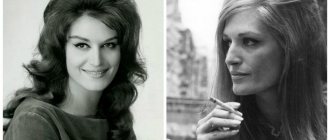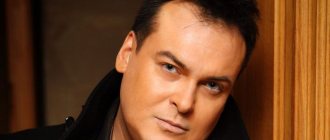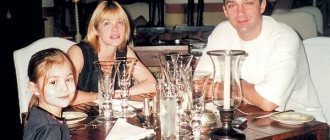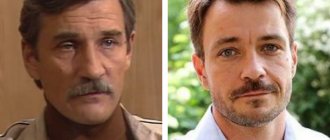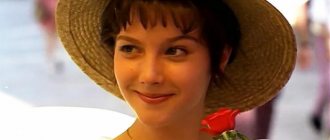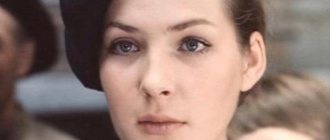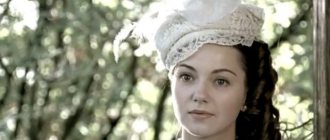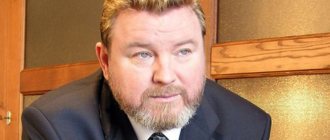Childhood
Dobronravov's parents got married in 1927 and moved to Leningrad. In this city, on November 22, 1928, their first-born Kolenka was born. Later, another boy was born in the family - Dima.
Dad, Nikolai Petrovich Dobronravov, had the profession of an engineer and worked at a factory. On the paternal side, the ancestors were clergy and military officers of the White Guard squadron. Dad was arrested in 1937, Kolya could not even think that he was seeing him for the last time, the boy was only nine years old.
Mom, Elena Dmitrievna Dobronravova (maiden name Doroshevskaya), was involved in housekeeping and raising her son. She was also arrested after her husband, but my mother was able to survive in prison and returned a few years later. She lived a long life, which she dedicated to pedagogy and worked as a teacher.
Parents of Nikolai Dobronravov
Nikolai's upbringing fell mainly on the shoulders of his grandmother (father's mother). From an early age, she taught her grandchildren to be beautiful; together they went to the ballet and the opera, to performances in the puppet and drama theaters. They even heard the news that the war had begun in the theater. They came to the premiere, but never saw it; the performance was canceled due to the outbreak of hostilities.
Most popular works
Songs based on Dobronravov's poems have been heard for several generations. But, as before, they do not lose their relevance, freshness and depth of conveyed emotions. The following hits will forever remain in the biography of Nikolai Nikolaevich Dobronravov:
- “Tenderness” is a hit on a global scale: it has been covered not only by domestic but also foreign performers: Frida Boccara (France), Lourdes Gil (Cuba), Modern Talking soloist Thomas Anders (Germany), Ingrid (Italy), Slava Przybylska ( Poland). The text was translated into the languages of many countries, many recognized this song as a “hymn of love.” “Tenderness” was first performed by the great Maya Kristalinskaya, who, while performing, could hardly hold back tears of enthusiastic emotions from this unique work.
- “A coward does not play hockey” is considered the unspoken anthem of Russian hockey players, which has also been covered several times by modern performers: Sergei Mazaev, the group “Brilliant”, and for the first time back in 1968 it was performed by Vadim Mulerman.
- “Bird of Happiness” is an optimist’s song performed by various artists: V. Leontyev, Vitas, Nadezhda Chepraga.
- “I can’t do otherwise” - the song was performed by Valentina Tolkunova, remaining her calling card for all subsequent years. The melody of the singer’s voice perfectly emphasizes the lightness and purity of the song, loved by many women for its sincerity.
- “You are my melody” - the brilliant performance of Muslim Magomayev gave this work many years of popularity and numerous attempts to cover it.
- “Belovezhskaya Pushcha” - written in 1975. The song became the unofficial anthem of Belarus. Performed by the group “Pesnyary”, “Syabry”.
School and student years
At school, young Dobronravov liked literature most of all, the teacher taught this subject so interestingly and sensitively. At the age of ten, the boy learned the work “Woe from Wit” by heart, which greatly frightened his grandmother. She even made an appointment for her grandson to see a psychiatrist, but they reassured the granny and said that there were no pathologies in the child’s development, he just had a phenomenal memory.
Nikolai as a child with his younger brother Dima
During the Great Patriotic War, Nikolai and his brother were evacuated from Leningrad to an orphanage in the city of Gorky (now Nizhny Novgorod). From there they returned to the village of Malakhovka near Moscow, where Kolya graduated from high school, receiving a gold medal.
In high school, Nikolai had a choice - where to go next: to a literary institute or a pedagogical institute? But after receiving the certificate, his views changed, he submitted the documents to the Moscow Art Theater School.
Awards
Nikolai Nikolaevich Dobronravov was repeatedly awarded honorary titles, prizes and orders.
The poet received his first recognition from the authorities back in 1978 - it was the Lenin Komsomol Prize, a rather significant award in those days. This was followed by the USSR State Prize in 1982, then the Order of the Banner of Labor and the Order of Honor in 1984.
Orders of Merit for the Fatherland of the third and second degree, the Bunin Prize, the Prize of the Ministry of Defense in 2020 - this is not a complete list of all the awards of Nikolai Nikolaevich, whose contribution to the development of art is incredibly huge and will be valued for more than one generation.
Creative path
During his student years, he began to write poetry, which quickly found admirers, because they told about what they had experienced and suffered - the fear of men who went to the front, degenerating into heroism and courage; the pain of wives and mothers who never received their loved ones back from the war. In his poetry, Nicholas talked about the heroic deeds of his compatriots; about the courage of those who remained in cities and villages besieged by the Nazis; about how people endlessly believed in the Great Victory.
Nikolai at the Moscow Art Theater School (center in the top row)
Having received his diploma in 1950, Dobronravov began his career in the theater for young spectators. Here, for ten years, he was involved in leading roles in several productions. During this period, Nikolai’s friendship and cooperation with the actor and poet Sergei Grebennikov began. Together they wrote works for children's puppet theater. For example, the play “The Lighthouse Lights Up” was staged in Youth Theaters throughout the country for a long time.
Further collaboration between the young poets resulted in the opera “Ivan Shadrin,” which was first staged at the theater in the city of Kuibyshev. Poems by Dobronravov and Grebennikov began to be read on pioneer radio stations.
In 1952, Nikolai received a second diploma of higher education at the Moscow City Teachers' Institute, specializing in literature teacher. In addition to theater, Dobronravov’s creative biography also included cinema. He starred in several films:
- 1951 - “Sporting Honor” (here the actor has a minor role as restaurant visitor Platon Platonovich);
- 1953 - “The Return of Vasily Bortnikov” (in this film Nikolai played the young Komsomol member Seryozha).
However, Dobronravov was not very impressed with the actor’s profession; he liked writing poetry more and more. Nikolai adored children's literature, and it played a key role in his life.
Nikolai Dobronravov in the cinema
The aspiring poet was often invited to radio stations, where he recited his poems and read plays, and participated in dubbing children's programs. Once during the summer school holidays, he was offered to compose a theme song in collaboration with the already famous composer Alexandra Pakhmutova in the Soviet Union. Working together on the song “Motor Boat” brought them so close that the collaboration grew into touching romantic feelings.
Literary creativity
Dobronravov Nikolai Nikolaevich began writing during his years of work at the Theater for Young Spectators, in the distant 50s: even then, in collaboration with the actor Grebennikov, the first New Year's dramatizations, children's plays and fairy tales were written, which were staged in theaters. And even now, some theaters present them with pleasure.
At the dawn of the 60s, a play for children, “The Lighthouse Lights Up,” was written, which is still performed at children’s parties, and soon a libretto was created, based on which “Ivan Shadrin” was staged a little later. The biography of Nikolai Nikolaevich Dobronravov includes close cooperation with the Young Guard publishing house, one of the largest in the Soviet Union. Thanks to this, the following works were published:
- "Hawkhorn Island."
- "The beacon lights up."
- “Desperate, set sail!”
- "Holidays are coming soon".
- “The third one is not superfluous.”
The poems of Nikolai Nikolaevich Dobronravov are a separate story, moreover, this is a whole era of lyrical, soulful and heartfelt lines that roamed the expanses of the Russian-speaking space. Even now, the brilliant poet does not give up his position, presenting the world with his next brainchild. Over fifty (!) years of creativity, many collections of poems were published, which formed the basis of many songs, poetic short stories and reflections on the eternal theme of good and evil, attitudes to life, the human soul and his actions. Very poignantly he touches on the theme of the war, which has passed as a bold red line in the biography of Nikolai Nikolaevich Dobronravov, which is deeply reflected in the well-known songs: “Children of War”, “And the Battle Continues Again”, “Belarus”.
Love for life
Three months after they met, in August 1956, Dobronravov and Pakhmutova got married. There was no money for a magnificent celebration, so they celebrated the wedding modestly. When leaving the registry office it began to rain heavily, the newlyweds decided that this was a good sign. And so it happened, they already have a golden wedding behind them, and their couple is considered one of the strongest in the history of Soviet and Russian art.
The newlyweds spent their honeymoon in Abkhazia with Alexandra’s relatives. On their wedding night we went to look at the paths of moonlight on the water surface of the Black Sea. More than once in an interview, Nikolai and Alexandra recalled their first vacation, it was modest, but the best and happiest. They spent days on end at the sea, sunbathing and swimming, sharing further creative plans. And when they came home, Alexandra’s aunt treated them to delicious national dishes of the Caucasus and wine.
Nikolai says that what captivated him about his wife was the incredible brightness of the fire in her eyes, which flared up at any mention of music. He himself lit up in the same way when it came to his favorite poetry. From birth, this talented family spoke the language of songs, became a single whole, and no one perceived them separately.
Dobronravov and Pakhmutova have been married for more than sixty years, but it is still clear that these people truly love each other. Their union is an example of tenderness, love and care. When asked about the secret of family happiness, the spouses quote Antoine de Saint-Exupéry: “Loving does not mean looking at each other. It means looking in one direction.”
The couple has no children. They consider all the talented children whom they helped make their way in life to be their kids.
Personal life
The poet considers one of his most successful days to be his meeting with Alexandra Pakhmutova in 1956, when they began working on their first common project: a children's song for the program. This is exactly the same Love that they write about in novels and make films: for fifty years the couple has never parted, and the fire of love that was lit more than half a century ago still shines in their eyes.
They got married six months after their first date, and continued to walk hand in hand all their lives: in the family, in everyday life and in their favorite job. Unfortunately, the brilliant couple has no children: the family of Nikolai Nikolaevich Dobronravov is only his beloved Alechka. But who knows: would they have created such a record number of songs, poems and melodies if they still had children? Maybe this is a will from above so that they do not scatter their talent on other aspects of life, completely devoting themselves to art?
Strong creative tandem
The personal and creative lives of two talented people organically intertwined, which gave birth to a wonderful duet. Their joint work resulted in hundreds of songs, without which it is now impossible to imagine Soviet films or important events, such as the flight of the first man into space, the Summer Olympics in Moscow in 1980, and the construction of the Baikal-Amur Mainline.
Dobronravov and Pakhmutova traveled a lot around the Soviet Union, to big cities and small workers' villages, to Komsomol construction sites and sports competitions, to collective farms, factories and factories. They introduced ordinary people to their work, and also drew ideas for new compositions.
Nikolai Dobronravov also collaborated with other composers - Arkady Ostrovsky, Mikael Tariverdiev, Eduard Kolmanovsky, Evgeny Martynov, Arno Babajanyan. But the best songs appeared in collaboration with his wife.
They say that in songs, music and poetry should be born simultaneously, in harmony with each other. Alechka (as Dobronravov affectionately called his wife) became his inspiration and constant muse. From the pen of this amazing creative tandem came the following famous songs:
- "Coward does not play hockey";
- "Belovezhskaya Pushcha";
- "The Bird of Happiness";
- "Belarus";
- “Eaglets Learn to Fly”;
- “The main thing, guys, is not to grow old in your heart!”;
- "Tenderness";
- “Goodbye, Moscow, goodbye!” (farewell at the closing ceremony of the Olympic Games);
- “We cannot live without each other”;
- “I can’t do otherwise”;
- "Hope";
- “You know what kind of guy he was”;
- “Our Youth Team”;
- "Old Maple";
- "How young we were";
- “And the battle continues again.”
Their songs were performed by the best pop singers: Maya Kristalinskaya, Alla Pugacheva, Muslim Magomaev, Anna German, Joseph Kobzon, Edita Piekha.
For his many years of creative work, poet Nikolai Dobronravov has received many awards:
- Order of the Badge of Honor, Red Banner of Labor, “For Services to the Fatherland”, II and III degrees;
- Prizes of the Lenin Komsomol, State USSR, Ministry of Defense of the Russian Federation in the field of culture and art;
- the title of Honorary Professor of Moscow State University and Honorary Citizen of the city of Bratsk.
Nikolai Dobronravov - biography
Name : Nikolay Dobronravov
Date of birth : November 22, 1928
Zodiac sign : Scorpio
Age : 90 years
Place of birth: St. Petersburg, Russia
Occupation : poet, actor
Tags : actor, poet
Marital status : married to Alexander Pakhmutov
Nikolai Dobronravov is a Soviet and Russian songwriter, author of lyrics for most of Alexandra Pakhmutova’s songs. Among the jointly created hits, the most popular were the songs “Hope”, “And the battle continues again”, “Tenderness”, “Team of our youth”.
Nikolai Dobronravov was born in 1928 into an intelligent Leningrad family. According to his zodiac sign, Kolya was born Scorpio. His upbringing as a child was primarily done by his father’s mother. She went with the boy to theaters, introduced him to various types of art: opera, ballet, puppet and dramatic performances.
At the age of ten, young Kolya became so imbued with a love of literature thanks to the lessons of a sensitive school teacher that he memorized the play of the Russian classic “Woe from Wit.” After this incident, the poor grandmother of the future poet became very frightened and made an appointment for her grandson in a psychiatric office. But the doctor, of course, did not see anything pathological in the child’s abilities.
During the war, Nikolai Dobronravov’s family moved to Nizhny Novgorod, and then his parents moved to a village near Moscow. In Malakhovka, the boy studied at the 10-year school, receiving a red certificate upon completion.
At a young age, the future poet chose between pedagogical and literary institutes. However, he reconsidered his views and became a student at the Moscow Art Theater School. After graduating from school, the aspiring actor got a job at the Moscow Theater for Young Spectators, where he acquired his first skills in writing texts.
In a creative union with another theater actor, Sergei Grebennikov, the young author created short plays for children's amateur performances and for the puppet theater. Trying their hand at drama, young people come up with the text “The Lighthouse Lights Up,” which was later often staged in Soviet Youth Theaters. The artists’ works could be heard on pioneer radio stations, and the opera “Ivan Shadrin”, based on a libretto by capital authors, was staged in the city of Kuibyshev.
At the same time, Nikolai tried his hand at the art of cinema. In the early fifties, he starred in 2 Soviet films. The first of them – “Sports Honor” – was dedicated to sports. In this film, Dobronravov played the role of a restaurant visitor. The film story “The Return of Vasily Bortnikov” about life on a collective farm, in which Nikolai played a young Komsomol member, brought together the stars of the era on one work site. In the film, the main characters were played by Sergei Lukyanov, Vsevolod Sanaev, Anatoly Chemodurov, Inna Makarova.
By this time, Nikolai’s soul was already quite “infected” with literature. And after graduating from a theater university, Nikolai Dobronravov decides to study at a pedagogical institute with a degree in literature teacher. As the poet himself says, in his childhood and youth he did not think that he would be passionate about poetry. But over time, the desire to write poetry became more and more apparent in him.
Nikolai Dobronravov was a frequent guest on children's radio. He voices children's poems and plays. One day, on the eve of the children's holidays, he was asked to compose poems for the simple song “Motor Boat”, the composer of which was the young Alexandra Pakhmutova. Spending all their time together creatively, the young people became so carried away by each other that after 3 months they decided to legalize their relationship. Thus was born a loving family and a strong creative tandem. Personal life and creativity were so organically intertwined in the fate of two talented people.
From then on, Nikolai Nikolaevich decided to leave the theater stage and devote himself entirely to poetic creativity. His wife Alexandra became the poet’s constant muse and inspiration. Creative people were convinced that in a song, music and poetry should be born simultaneously, harmoniously influencing each other. However, sometimes Nikolai Nikolaevich had to compose words to an existing musical text, which he compared in complexity to translating foreign poetry into his native language.
From the pen of the creative couple come famous songs of the era: “And the battle continues again,” “How young we were,” “The team of our youth,” “Hope,” “Hugging the sky,” “Heroes of sports,” “A coward does not play hockey". The musical composition “Tenderness” was especially popular, the first lines of which – “The earth is empty without you” – soon after Tatyana Doronina’s performance in the film “Three Poplars on Plyushchikha” was heard from all the windows of the country. Dobronravov and Pakhmutova came up with not only songs for films. The husband and wife also wrote a lot for the stage.
Their compositions to this day are included in the collection of the best Soviet hits performed by such singers as Maya Kristalinskaya, Edita Piekha, Joseph Kobzon, Anna German, Alla Pugacheva and others.
The happy married couple gave hits to the public and artists, but one day they directly influenced the reunion of the lovers. They turned out to be the stars of the Soviet stage - Muslim Magomayev and Tamara Sinyavskaya. Both were in love with each other, but Tamara, being married to her first husband, decided not to destroy the family for the sake of a new relationship. Having learned about this, Pakhmutova and Dobronravov came up with 2 lyrical songs for the vocalists. The musical composition “Melody” was written for Magomayev, and the authors gave the hit “Farewell, Beloved” to Tamara Sinyavskaya. While learning songs, the lovers realized that they could not live without each other.
Especially for the 1980 Olympics, Pakhmutova and Dobronravov wrote the song “Goodbye, Moscow, goodbye,” which became the farewell anthem of the famous event.
The sports theme inspired the songwriter to create a script for a feature-documentary film, which appeared on screens in 1981 under the title “Oh sport, you are the world!” The tape featured compositions created by Dobronravov together with Alexandra Pakhmutova. In the same year, musical songs were published on. The disc was called “Bird of Happiness”. Director Yuri Ozerov, sports commentator Nikolai Ozerov, and animator Fyodor Khitruk took part in the creation of the film. All authors received a significant award - the State Prize of the Soviet Union.
In addition to co-authoring with Alexandra Pakhmutova, Nikolai Nikolaevich also worked with other composers. He spoke very sensitively about working with Mikael Tariverdiev, with whom the poet created several masterpieces: “The Little Prince”, “Premonition of Love”, “Your Voice”. In addition, he composed poems for compositions by Arno Babajanyan, Evgeny Martynov, and Arkady Ostrovsky.
The theme of war remained an exciting topic in the poet’s work. At the beginning of the 2000s, Nikolai Dobronravov created a poetic work dedicated to his generation, “Military Shards.”
In total, the poet created over 500 songs, most of which were scattered into catchphrases: “Do you know what kind of guy he was?”, “We can’t live without each other”, “Bird of happiness of tomorrow”, “We have already played the first half " Thus, Dobronravov repeated the fate of his favorite author Alexander Griboyedov, whose play was once, among other things, dismantled into quotes.
The poet is also close to patriotic themes. Together with Alexandra Pakhmutova, the song “My Bitter Motherland” was invented, which firmly entered the repertoire of the Kuban Cossack Choir, People’s Artist of Russia Tatyana Petrova, and singer Nadezhda Pyankova.
Nikolai Dobronravov and Alexandra Pakhmutova not only worked on composing songs, they are also active participants in Mosconcert tours. With a program in which Alexandra took part, playing the piano, and Nikolai performed personal poetic compositions, they toured the whole country. They themselves can no longer count how many concerts have taken place over so many years of moving. Each time their admirers greeted them warmly and hospitably.
On the stage you don’t often see a couple who preserved their love until old age, despite the fact that Nikolai and Alexandra never had children. A memorable joint biography, full of accomplishments and creative successes, more than fills this gap.
To this day, Nikolai Dobronravov continues to write poetry. He published many of his poetry collections: “Taiga Fires”, “Eternal Alarm”, “Poems”, “My Faith”, “An Unfamiliar Star Is Shining”. Of course, in his work one can see a growth from enthusiastic lyricism to deep philosophy. In his latest works, the poet often turns to religious themes.
Currently, Nikolai Dobronravov’s health does not allow him to participate in as many concerts as before. But last year, the author pleased admirers of his work with his participation in the “White Studio” program, which airs on the “Culture” channel. Together with his wife, Nikolai Dobronravov appeared in an episode of the talk show “Tonight”.
At the beginning of this year, the authors presented a new military song, “Kursk Bulge,” which they prepared for the TV movie “Strong Armor.”
Works
- "Belovezhskaya Pushcha"
- “The main thing, guys, is not to grow old in your heart!”
- "Goodbye, Moscow, goodbye"
- "Good Tale"
- “I can’t do otherwise”
- "Starfall"
- “And the battle continues again”
- "How young we were"
- "Our Youth Team"
- "Melody"
- "Hope"
- "Tenderness"
- "Hugging the Sky"
- "Coward does not play hockey"
Source
Poetry collections
Nikolai Nikolaevich has many published collections of poetry:
- “An unfamiliar star is shining”;
- "Taiga fires";
- "Gagarin Constellation";
- "My Faith";
- "Eternal anxiety."
In 2020, Dobronravov presented a new poetry collection, “How Young We Were,” which was the result of his creativity over the past few years. The collection includes about two hundred poems, many of them published for the first time. A philosophical theme is becoming increasingly evident. A key thread runs through the works, which is associated with feelings of rethinking the concept of “homeland”. The second theme of the collection is Faith, reflections on the place of God in our souls. At the presentation, the poet said that he believes in Russia and its revival.
Becoming a poet
In the mid-60s, Nikolai Nikolaevich decided to leave the theater, deciding to implement his ideas in the field of literature. In 1970, Dobronravov was accepted into the USSR Writers' Union, where he was able to fully realize his creative potential. Actively working in the field of culture and literature, the artist became a famous and recognizable author.
His poetry collections, glorifying the ideology of the USSR and Soviet life, began to be published in large editions in the country's leading printing houses. Capital publishing houses published several of his poetry collections, such as “Gagarin’s Constellation”, “Taiga Fires”, “Eternal Alarm” and several other books.
M. Dobronravov famous poet
The songwriter gained many fans in the USSR, who were looking forward to new collections. Each edition published under the name Dobronravov was sold out with incredible speed. And even now, in modern Russia, books with poems by Nikolai Nikolaevich are very popular. The literary figure continues to publish new collections, expressing his ideas and thoughts, dreams and vision of modern Russia to the general public.
Biography of the poet Nikolai Dobronravov
Nikolai Nikolaevich was born into a family of intellectuals, in the cultural capital of our Motherland - the city of Leningrad, in November 1928. The boy was raised by his paternal grandmother. It was she who began to introduce Nikolai to beauty from an early age. She took him to performances, introduced him to the world of opera, ballet, puppet and drama theater. Nikolai Nikolaevich even heard the message about the beginning of the war while in the theater. Having come to the performance, he never watched it; the premiere was canceled due to the outbreak of hostilities.
During wartime, Nikolai Nikolaevich’s family went to Nizhny Novgorod, and then the parents and the boy settled in a village near Moscow. In Malakhovka, Nikolai graduated from school with a gold medal, which is not surprising for such a diligent student. When school time was over, the young poet faced a difficult choice: where to continue his education, at a literary or pedagogical institute. Unable to make a final choice, the poet settled on the third option; he submitted documents to the Moscow Art Theater School and entered there with ease. After graduating from a higher educational institution, Nikolai decided to continue gaining knowledge at the Pedagogical Institute. V. P. Potemkina.
Dobronravov became recognizable during his school years. The echoes of the war they experienced made themselves felt and resulted in songs that everyone could understand. He talked not only about the fear of men going to war, about their courage and heroism, but also about the feelings of mothers, wives and children who never received their relatives from the front. He spoke about the courage of people who lived in besieged cities, about the heroism of compatriots, about endless faith in the Great Victory.
Childhood and adolescence
The future Russian theater and film actor Viktor Dobronravov was born on March 8, 1983 in the Rostov region, in the port city of Taganrog. The celebrity's father, Fyodor Viktorovich Dobronravov, is a People's Artist of the Russian Federation, who has been interested in acting since early childhood. Victor's mother, Irina Dobronravova, devoted her life to pedagogy and worked as a teacher in a kindergarten. Later she became a school teacher. In addition to Victor, the family had a younger son, Ivan , who also became an artist.
Dobronravov family
When Vita was five years old, he moved to Voronezh with his parents . The father of the future artist tried to enter the theater institute, but nothing worked out. At that time, the Dobronravovs had no money, so from time to time Fedor worked as a janitor to provide for his family. Soon Dobronravov Sr. nevertheless became a famous artist and constantly toured the territory of the Soviet Union. Arkady Raikin noticed the talented actor and invited him to the Satyricon troupe.
Victor’s father brought unusual gifts from his tour. As a child, the guy preferred to read books, watch films and was interested in art. The parents were surprised at their son’s interests, since most of his peers at that time played football or disappeared in the yard. The artist dreamed of becoming a cook, so he often helped his mother with housework.
Fyodor Dobronravov with his son Victor and Ivan
As a teenager, Fyodor Dobronravov often took his son with him to the theater. Curious Victor watched with surprise behind the scenes, at the actors’ performances. The guy spent his childhood behind the scenes of Satyricon. Most of all, Vita liked to watch his father transform into various heroes. Often theater artists came to visit the Dobronravovs and told interesting stories about their careers.
Fyodor Dobronravov with his son Victor and Ivan
During the holidays, Vitya and Vanya went to visit their grandmother in the village , where they spent all their time on the river bank. At school, the future representative of Russian cinema was an excellent student. Both the humanities and the exact sciences were given to him with ease. He was responsible for his studies, did not skip classes, and studied course material every day. In his free time, he tried to earn extra money in order to be independent and help his parents financially. Victor worked as a stage assembler, where he was paid little.
Victor Fedorovich Dobronravov
Classmates and school teachers loved the artist for his responsiveness, humor and sincerity. As a teenager, Victor, like many of his peers, became interested in various subcultures and began smoking and drinking alcohol. According to the artist, in this way he tried to assert himself and stand out from the rest; youthful maximalism raged within him.
Fyodor treated his son’s tricks with understanding. He conducted educational conversations. Both Victor and Ivan grew up to be decent and responsible young men. The parents of the artists tried to make worthy individuals out of their sons.
After graduating from secondary school, both Dobronravovs entered the Boris Shchukin Theater Institute. Victor visited the creative workshop of Evgeniy Vladimirovich Knyazev for several years.
Viktor Dobronravov in the film “Code of Honor”
